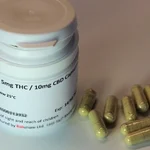Anxiety and depression are two of the most common mental health disorders, affecting millions of people worldwide. While traditional medications can be effective, they often come with a long list of possible side effects, leaving many people searching for alternative treatments. Medical marijuana has been gaining popularity in recent years as a potential treatment option for anxiety and depression. In this essay, we will explore what medical marijuana is, how it works, and its potential benefits for those struggling with anxiety and depression.
Understanding Medical Marijuana
Medical marijuana refers to the use of the marijuana plant or its extracts to treat a variety of medical conditions. The plant contains hundreds of chemical compounds, including cannabinoids. Cannabinoids interact with the body’s endocannabinoid system, which plays a role in regulating mood, appetite, and pain. The two most well-known cannabinoids are tetrahydrocannabinol (THC) and cannabidiol (CBD). THC is the psychoactive compound that gives users a “high” feeling, while CBD is non-psychoactive and has been studied for its potential therapeutic benefits.
Medical marijuana is available in various forms, including:
- Dried leaves and flowers
- Oils and tinctures
- Edibles, such as gummies or baked goods
- Topical creams and lotions
In many states, medical marijuana is legal with a prescription from a certified physician. However, it is important to note that marijuana is still considered a Schedule I drug at the federal level, which means it is illegal.
The Science Behind Medical Marijuana
The endocannabinoid system plays a crucial role in the regulation of anxiety and depression. Studies have shown that individuals with anxiety and depression may have an imbalance in their endocannabinoid system, leading to decreased production of endocannabinoids. This imbalance can lead to a range of symptoms, including anxiety, depression, and chronic pain.
CBD has been studied for its potential therapeutic benefits in treating anxiety and depression. While the exact mechanism of action is not fully understood, it is thought that CBD works by increasing the production of endocannabinoids and interacting with serotonin receptors in the brain.
THC, on the other hand, has been shown to have mixed results in treating anxiety and depression. While low doses may have a calming effect, high doses can actually increase anxiety and paranoia. Additionally, long-term use of THC has been linked to an increased risk of developing psychotic disorders.
The Benefits of Medical Marijuana for Anxiety and Depression
Medical marijuana has been studied for its potential benefits in treating a variety of medical conditions, including anxiety and depression. Here are some of the potential benefits:
Reduced Anxiety
CBD has been shown to have anxiolytic (anti-anxiety) effects in both animal and human studies. One study found that CBD significantly reduced anxiety in individuals with social anxiety disorder. Another study found that CBD reduced anxiety in individuals with generalized anxiety disorder.
Improved Mood
CBD has also been studied for its potential mood-enhancing effects. One study found that CBD had antidepressant-like effects in mice. Another study found that CBD may have potential as a treatment for both anxiety and depression.
Reduced Pain and Inflammation
Chronic pain and inflammation are often associated with anxiety and depression. Medical marijuana has been studied for its potential pain-relieving and anti-inflammatory effects. THC has been shown to have analgesic (pain-relieving) effects, while CBD has been studied for its potential anti-inflammatory effects.
Reduced Insomnia
Insomnia is a common symptom of both anxiety and depression. Medical marijuana has been studied for its potential sleep-enhancing effects. One study found that medical marijuana improved sleep in individuals with chronic pain.
Potential Side Effects and Risks
While medical marijuana may offer potential benefits for those struggling with anxiety and depression, it is important to note that it is not without potential risks and side effects. Common side effects may include:
- Dry mouth
- Red eyes
- Increased appetite
- Dizziness
- Fatigue
Additionally, long-term use of THC may be associated with an increased risk of developing psychotic disorders. It is important to speak with a certified physician before using medical marijuana to treat anxiety and depression, as they can help determine if it is the right treatment option for you.
Conclusion
Medical marijuana has gained popularity as a potential treatment option for anxiety and depression, thanks in part to its potential therapeutic effects on the endocannabinoid system. CBD has been studied for its potential anxiolytic and mood-enhancing effects, while THC has been studied for its potential analgesic effects. While medical marijuana may offer potential benefits, it is important to speak with a certified physician before using it to treat anxiety and depression. They can help determine if it is the right treatment option for you and can help monitor any potential risks or side effects.












